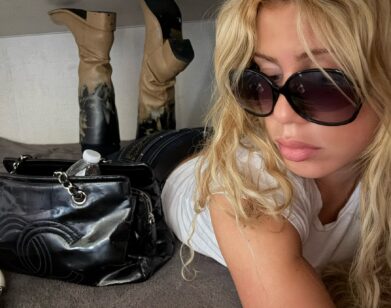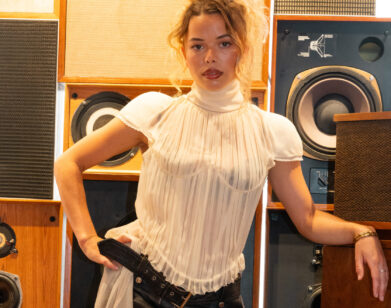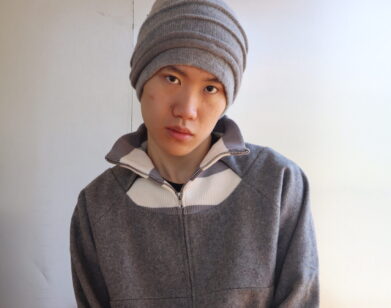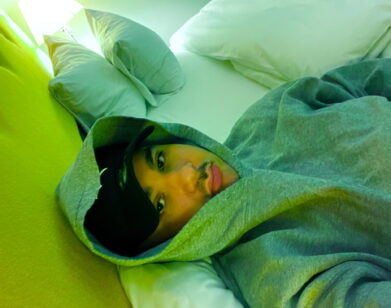Exclusive Song Premiere and Interview: ‘Cascading Keys (Casimer & Casimir Remix),’ Alice Cohen
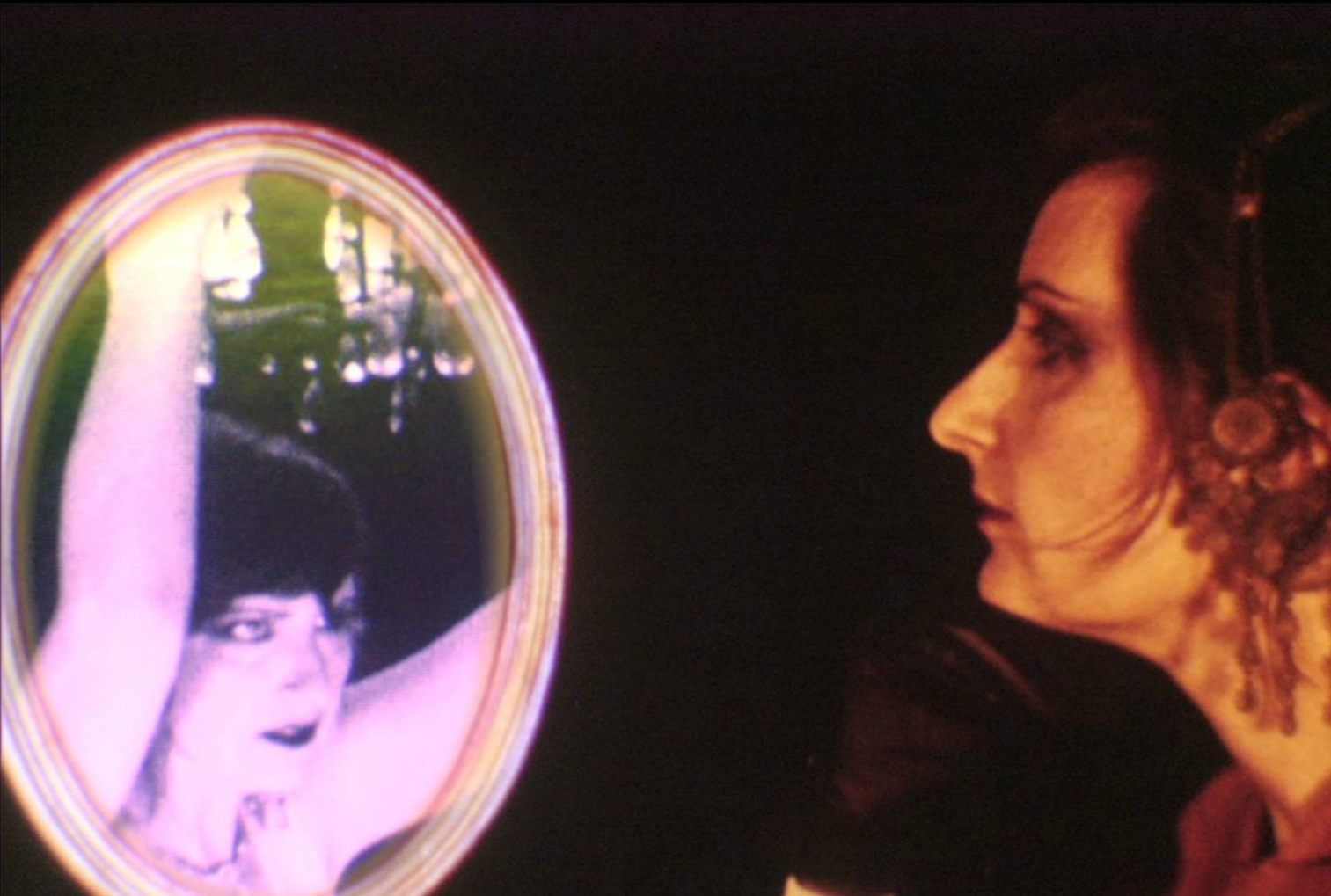
That Alice Cohen isn’t a household name is an unfortunate oversight in the history of pop. Cohen started making music during the waning days of disco, before forming New Wave group The Vels in 1980. While they had some success on MTV with 1984’s “Look My Way” (a great pop tune made even better by a Pee-Wee’s Playhouse-esque video—and Cohen’s rapping), the group had disbanded by the end of the decade. Soon after, Cohen traded keyboards for aggressive basslines as a member of the grunge-leaning Die Monster Die, before focusing on her career as an animator and visual artist.
Over the past few years, Cohen’s music has returned to the keyboard-driven sounds of the ’80s, and her latest album, Pink Keys, is a dream-pop odyssey comprised of carefully sewn-together analog synths. It’s a record that both recalls Cocteau Twins and ‘90s Pure Moods compilations (the latter is a compliment), and conjures up a fantastical landscape that’s best described by Cohen herself as music for “cosmic discotheques, dark misty beaches, tawdry hotels.”
Along with the release of the album, Alice Cohen has enlisted Chicago synthpop duo Casimer & Casimir to reinterpret the opening track “Cascading Keys.” You can hear their version of the song exclusively here, as well as read our interview with Cohen, below.

NATHAN REESE: With a career as long and varied as yours, what did you want to accomplish with Pink Keys that you hadn’t with your earlier work?
ALICE COHEN: I wanted to create something that would showcase what I had been exploring musically in the last few years—I had been freeing up my synth playing, getting into more improvisation, and heading in a cosmic direction… a bit trippy and meditative, with lots of layers. At the same time, I wanted to draw on my early influences stylistically—funk and dance beats, soulful vocals, and somewhat-sophisticated production values, so the album became a place for me to play with everything I had learned up until this point as an artist. I also wanted it to contrast with the very loose way I had recorded Walking Up Walls, and show the side of my songwriting that has actual lyrics, harmonies, and arrangements with a lot of thought put into them, as well as a more evolved recording process.
REESE: How would you describe the mood of the record?
COHEN: Some of it is quite fairytale-like… processions approaching over a hill, cosmic discotheques, dark misty beaches, tawdry hotels. I hope what comes across is a dreamy mood and atmosphere, unfurling the way dreams play like films inside of our heads. I would like the album to transport people to places that feel otherworldly and timeless—it could be an era from the past, but could just as easily be in the future. My purpose is similar to the function of dreams: to take the listener to their inner planes. I like to think of it as a musical version of astral traveling.
REESE: How did the Casimer & Casimir remix come about? What’s your impression of their version of “Cascading Keys”?
COHEN: I’ve only heard an excerpt from the remix so far, and I’m super excited that they made at least a part of it sound a bit like Phillip Glass—or some sort of minimalist classical music. It’s been super liberating to hand over the tracks to another artist, and have them just go crazy and do whatever they want. It feels good to relinquish control to someone else and hear a completely unexpected, fresh reinvention. I didn’t know a whole lot about Casimer & Casimir before this remix. Todd from [Alice Cohen’s record label] Olde English Spelling Bee introduced me to their music, and I was impressed—It was really ambitious and complex, and that appealed to me, so we reached out to them, and they picked “Cascading Keys” as the song they wanted to interpret.
REESE: While other artists have been experimenting with analog synths and keyboards a lot lately, you were making music with those instruments when they were relatively new. What made you want to return to those sounds?
COHEN: Piano was my first instrument, and working with keyboards is definitely different than working with guitar or bass. Guitar brings out the aggressive rocker part of myself, and it can be more raw, body-oriented, and physical, while keyboards and synths feel more cerebral, mental, space-age, and delicate. I can get in a place when I play keyboards that connects to classical music as well as new age, space-age, and classic songwriter styles, but I can also find these really funky dance-y sounds.
There has been a real renaissance and new appreciation amongst younger musicians for synth music, and people are doing some really interesting things with it. At other times, I’ve noticed a real rejection of synth music, and a need to have a more rock, guitar-based, un-synthetic approach. So with the new synth-pop renaissance of the last few years, I’ve personally found a comfort zone in returning to that familiar territory—and it feels nice to know that I’ve played with it in another era of my life, but can come back to it now, with a fresh, new perspective.
REESE: How have the music scenes you’ve been involved in changed over the years?
COHEN: In some ways, the current music scene is not that different from the way the music scene has always been—bands try to get their music out there as best they can, recording, touring, etc. I think there are tons of interesting bands out there today, but I do think that the “easy access” that the Internet provides, has changed something about the way a musician’s creativity works… we’re exposed to so much now, on such a regular basis, with just a click of the button, and because of this, people’s attention spans seem much shorter, and there’s an instinct to want to do things very quickly and get it out there as soon as possible.
You used to have to get up and go out to the record store or the club, or turn on the radio. There was a slower pace, and less staring at a screen or phone, as well as less constant input of sound and images. You could absorb things a little more slowly. And I think people engaged in music differently. There were more small, local scenes that were very idiosyncratic. Maybe being exposed to less made things more interesting.
REESE: Would you say that Internet culture is at the heart of those changes?
COHEN: I remember the Philly art rock scene in the early ’80s to be very fun and personal, and I know that type of thing still exists today, but there is a different kind of energy now that is spent on blogs, Bandcamps, SoundClouds, Facebooks, Twitters, etc., whereas in the past we would make handmade Xeroxed posters and walk around the street gluing them up. So, I would say there are some similarities in the urges we all have to share our music, but the methods are less tactile and that’s reflected in the actual music, the culture surrounding the music, and the way it’s produced.
There’s a lot of recording at home on GarageBand or Pro Tools—you don’t have to spend money going into a studio, so this gives a certain freedom to people, but also changes the sound of the music itself. The atmosphere is very different today—at the same time there’s this easy access to anything on the Internet, so people’s knowledge and exposure to many things is unlimited. Then, as always, it’s up to the artist, how to apply that knowledge into their own art.
REESE: What artists have you been listening to lately? Is there anyone you find particularly inspiring?
COHEN: I’ve been enjoying listening to SSION, Grimes, D’eon, Phedre, Blues Control, DIIV, Peaking Lights, Maya, and Future Shuttle lately. Blues Control in particular has been getting into some really amazing piano work, that I find especially inspiring and original sounding. The organic quality of the piano sound, as well as the playing itself, sounds really fresh.
REESE: How did growing up in a musical family effect the music you make?
COHEN: My parents were jazz musicians, so I grew up hearing a lot of Bill Evans, McCoy Tyner, and other sophisticated stuff. I liked some of it—for instance, “Maiden Voyage” by Herbie Hancock… even now, it’s a very inspiring piece. But, as a kid, I was much more into The Beatles and The Monkees, and AM radio pop music, and I thought jazz sounded like the musical equivalent of “scribble.” Looking back though, I’m sure that hearing that sophisticated music at a young age stretched my ears, and helped me understand a lot about harmony and rhythms because it was such developed music, and it was sinking in on this subliminal level. Even though I went in a more pop direction, I can totally appreciate jazz now, and see that it helped develop my ears and my understanding of music. My parents were always having musicians over to our house for jam sessions, and we had a little recording studio in our basement. I went my own way, musically—in a much more pop and rock direction, but basically I believe: if you’re a musician, you’re a musician. It doesn’t really matter what the style is—it’s something that’s deep in your soul.
REESE: As well as a musician, you’re also a visual artist. How do visual elements come into play when you’re writing your music?
COHEN: I visualize scenarios for each song, and they are very clearly defined. Once they’re conjured up, they consistently “look” that way in my mind. I sometimes will find a photo or image that corresponds, and I’ll pin it up in my workspace, where I record. The album cover for Pink Keys was the first element in conceptualizing the album—I came across a small illustration of two keys on a pink background in an old book and immediately knew: this should be an album cover. The album insert photo of the costumed people is a still from a French film called Le Grand Meaulnes, which was based on the book of the same name. It had a chapter called “La Fête Étrange,” and that image inspired my song “La Fête Étrange.” So I would say that, yes, visuals are definitely intertwined with my music.
REESE: What music or albums inspired the making of Pink Keys?
COHEN: I played You Today by Martial Canterel quite a bit while making this album. Other records that served as inspirations were Reflections on Creation and Space by Alice Coltrane, “Cherchez la Femme” by Dr. Buzzard’s Original Savannah Band, “Street Life” by Randy Crawford, The Days of Mars by Delia Gonzalez and Gavin Russom, and “Raspberry Beret” by Prince.
REESE: Last, what’s the ideal environment you’d like someone to experience Pink Keys?
COHEN: Pink Keys would go well in a beach setting, on an airplane, or at home, while doing something relaxing like taking a bath. It would be nice to hear on a sunny day, while watering your plants or making coffee, but would also be nice to listen to while spacing out looking at clouds or fog. And it would be good to zone out to it with headphones on, while wandering around a bustling city or taking the subway or a ferry across a river.
PINK KEYS IS OUT NOW. FOR MORE ON ALICE COHEN, VISIT HER BANDCAMP.

